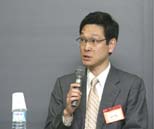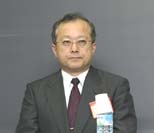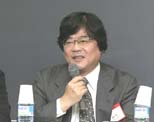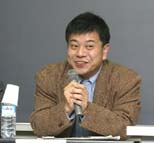| Part1. Memes vs. Genes: How should we create a balance between memes and genes? |
||
| Miyashita: My name is Miyashita of Shirayuri College. I will be serving as today's moderator. Today's symposium consists of two parts. Session One is "Possibilities and Challenges for Science that Integrates the Humanities" from the viewpoint of child science. In Session Two, I would like to open the floor to listen to various comments, including plans for the Japanese Society of Child Science. Sakakihara: I would like to talk about what pediatrics can and should do in a science that integrates the the humanities in its approach. Pediatrics came to Japan from Germany. Pediatrics is called "Knderheilkunde" in German, which means treatment for children or treatment skills. Knderheilkunde heals the human organs and body. This was the beginning of pediatrics in Japan. Therefore the department of medicine originated with science, in the skills to cure the human body. However, in France where Rousseau and Descartes come from, pediatrics is called puericulture because it has an artistic background. This is translated as "study of child rearing." Culture in French means culture. Therefore in some countries, pediatrics and medical treatment are traditionally parts of their child-rearing culture and arts. In Japan, however, we look at the human body in detail for treatment purposes, from the viewpoints of physiology, biochemistry and anatomy. This is very true in anatomy classes. The role of pediatrics is, of course, to cure diseases, but over time, it has come to give advice on child rearing. Professor Sakura said earlier that human bodies have not changed much over tens of thousands of years, but that our culture is far ahead of us. This is actually taking place in child rearing. Take, for example, the question of breast-feeding or bottle-feeding for babies. Breast milk is generated by the human genes, but we have made artificial milk or formula with the help of memes. "Which should we choose?" "What's good about bottle-feeding?" These questions are that other animals do not think about. Thus pediatricians are working between memes and genes in their daily activities. Another big issue among pediatricians is children's mental problems, both psychological and mental, such as polyergic disorder, ADHD, light autism and learning disabilities. For example, there are many children suffering from light autism and Asperger's syndrome; about one out of every one hundred children suffers from these diseases. Another 3% to 5% of children suffer from polyergic disorder. In other words, one out of every ten children may have some kind of problems. This raises the issue of brain science. These children have a common problem in their social skills; they cannot adapt themselves well to the society. Conventional analyses and reductionism cannot address these problems. Since I specialize in children's neurology, I think the keyword is "brain." Assuming that human behavior is decided by the brain, pediatric science must explore brain science. The problem is not a physical symptom such as fever or anemia but an issue of inadaptability to society. This is not only an issue for pediatrics but also needs to be addressed and discussed by various people in child science. |
||
|
||
| Miyashita: Thank you very much. The next speaker is Professor Kazuo Hiraki. Hiraki: I graduated from the department of science and technology. Students in the department of science and technology must be able to make something new, something artificial; they must have the sensibility to create what Professor Sakura calls a "meme." Creating a meme may sound somewhat strange, but now there are many artificial things such as TV games and television. Some people in the world are open to new things, while others are skeptical about them. For instance, many parents are concerned about the influence of TV games and television. As a father I am worried as well. I am studying how babies look at these artificial new things. For example, I am trying to find out whether six- or ten-month-old babies perceive images on the TV screen as real or not; or how they accept visual stimuli like TV games in which images move according to the babies' movements. However, I don't think that I can directly conclude that TV is good or bad. On the other hand, many professors in the department of engineering have a strong belief in the importance of creating things. Their students feel the same and many say that they are creating good things for others. When TV started to become popular, we didn't think much about its influence on children. I want my students to think about the benefits and possible adverse influence when they create something. By the way I am also studying how babies recognize robots. Robots seem to move on their own, but they are neither creatures nor human beings. My study focuses on how babies look at them. Asao: I hear that Professor Hiraki is studying how babies look at robots. I take AIBO (Sony's dog shaped entertainment robot) to a kindergarten and observe how children react. I feel very differently, however. I am rather concerned about new things. Professor Sakura says that human beings have made memes. Contrary to his opinion, I think that memes have influenced human genes; human beings came to have genes suitable to memes. That is to say, much of culture has been programmed into human instinct. For instance, babies are born very immature as if to depend on the memes of child rearing. They do not depend on the child-rearing instinct of their mothers. It seems that babies are dependent on the child-rearing skills acquired in maternal culture. The evolutionary process may take at least one hundred thousand to one million years, but memes have been changing every several thousands of years, or even less than every ten years. Now memes are putting abnormal pressure on human beings and this is the biggest concern for me. Specifically I am now studying about children's lack of interest in studying science. By interviewing elementary schoolteachers, for instance, I have learned that children today have very little exposure to nature. Some science teachers say that children cannot tolerate with labor hours and troubles required to grow morning glories or raise Japanese killifish. Children should be touched by the wonder of life and encounter subtle changes in living things every day. This should be the basis for interest in science or a sense of wonder. Children these days, however, do not seem to have such feelings. It is very hard to see the mechanism operating in artificial things. One can disassemble an old spring-loaded clock and easily see the springs inside, but it is hard to understand the mechanism of the modern clock. On the other hand, we can learn so much from nature; even a single leaf tells us that something great must have happened. I think that an encounter with nature is different from that with artificial things. The major problem in not knowing much about nature appears when people give birth to children and raise them. Artificial things or machines are intentionally made by humans and can be controlled by them, but child rearing is very different. We have to take care of children. They are hard to control and do not grow up as expected. Mothers may be irritated by them, or treat their babies simply as objects and think that they will grow up very easily as long as they feed and change their diapers. We hear similar stories very frequently. In fact there is a very complex interaction going on when dealing with babies, but it seems that child caregivers don't perceive this. In this sense, humans may change in the next one thousand years. Humankind may not give birth themselves. What is considered social behavior and social life could greatly differ from now, and people could be very different from what we are. It seems that everything we're discussing today is involved, and at the same time the boundaries between disciplines, not just between humanities and the sciences, are getting blurred. This is because if the human species changes greatly, so do the various assumptions on which the disciplines are built. |
||
| Miyashita: Thank you very much. Professor Sakura, do you have anything to add? Sakura: I would like to raise a question. Professor Hiraki explained that science did not contain much of a humanistic perspective and that the artificial was gradually becoming more influential. However, there seems to be a meme-oriented idea from time to time that one can make anything. I would like to ask Professor Hiraki how people with no scientific background should deal with such a reality. I have another question for Professor Sakakihara: how should we create a balance between memes and genes? Take, for example, the issue of breast-feeding or bottle-feeding. Some mothers bottle-feed their babies because they work or for many other reasons even though they know breast milk is better. This is not necessarily bad from a child rearing perspective. Then to what extent is this permissible? How can we reach a balance between genes and memes? After all, it may be case by case. I like to ask about universal validity, using various examples. Professor Asao, on the other hand, does not seem to be very critical of artificial environments. For example, children lack the patience to engage in encounters with nature. Is this because the current artificial environment is not very developed? Can something better replace the current environment or is it impossible for man-made environment to go beyond Mother Nature? I would like to ask these important questions. |
||
|
||
| Miyashita: Now we have many issues for discussion. Can Professor Hiraki start by responding to these questions? Hiraki: In fact I am now suspending my engineering studies. It is really hard for engineers to stop making things. Some will just continue their jobs even though they are told not to do so. The biggest concern is that some man-made things that are believed to be good may eventually turn out to be bad. At present this is difficult to judge. However, it is not only engineers who are responsible; some people in the society make money by selling goods while others want to buy and use them. Therefore we must think about this issue in terms of the whole social system where there are many people involved: makers, buyers and users. I would also like to say that many artificial things are different from real things. We actually look at them and are very sensitive to the differences. Engineering people are trying to see the difference first of all, so that they can make similar things. Asao: I wanted to see whether children show different behaviors when they are in contact with robots, compared with their interaction with living beings. That is the reason why I started using AIBO. My assumption was that there must some difference, but it is really hard to see. Then what happens if these robots are equipped with natural features? I don't think that there is anything wrong with virtual things. But virtual reality is very complex if it is something real or social. If there is no distinction between the virtual and the real, it becomes a kind of somebody else. Or it may be an independent mechanical living organism like in science fiction that cannot be explained by the laws of nature. This may really happen. We will then witness the birth of a mechanical living organism; in a sense we will become God. I may be going too far, but once something virtual and social comes into human life, it will lead to confusion for sure. It seems to me that this kind of confusion has already begun. I am 54 years old now. There were only radios when I was small. A surprising change has occurred in the past half century. All the people 50 years old and above are living witnesses of a big change in civilization. For example, I remember clearly how much I was impressed when I watched television for the first time. I thought that all Americans lived like they do in Western movies. So when I was a fourth grader in elementary school, I was greatly shocked to learn that there were not cool cowboys in America?ilaughter). Do children these days, who have watched television since they were born, have such surprising experiences? For example, they should know somewhere that Doraemon in the TV programs is a fiction. They may think that Doraemon exists, but it would be a shock to know that Doraemon is something virtual and it does not exist. My studies show that children go through this transitional period somewhat vaguely at about four years of age. I have not come to a final conclusion yet, but this is one of the big challenges of this field. Hiraki: I read a book entitled "Fantasy and Reality" by Professor Asao with much interest. The book refers to Santa Claus. Santa Claus was well known before televisions were invented and was very real. When we discipline our children, the most effective phrase is "If you behave like that, Santa won't come." This is the case for my daughter as well. Santa is not a man-made thing, but the whole society is creating a fiction and telling a lie to children. If a robot that looks surprisingly like a human being were invented and something like sexual selection were to take place, the opposite could happen, and people who are not very sensitive to this kind of thing would end up having offspring. However, since I am an optimist, I try not to think about the matter too seriously. Miyashita: Thank you for your comments. We have had a number of different discussions. Would Professor Sakakihara summarize and make comments? |
About Child Science
Viewpoint of Child Science Part1. Memes vs. Genes: How should we create a balance between memes and genes?
Profile:
Takashi Asao, Professor, Nara Women's College
Yoichi Sakakihara, M.D., Medical Director, Faculty of Medicine, The University of Tokyo
Osamu Sakura, Associate Professor, Interfaculty Initiative in Information Studies, the University of Tokyo
Kazuo Hiraki, Associate Professor, Graduate School of Arts and Sciences, The University of Tokyo
Takahiro Miyashita, Professor, Shirayuri Women's College
Yoichi Sakakihara, M.D., Medical Director, Faculty of Medicine, The University of Tokyo
Osamu Sakura, Associate Professor, Interfaculty Initiative in Information Studies, the University of Tokyo
Kazuo Hiraki, Associate Professor, Graduate School of Arts and Sciences, The University of Tokyo
Takahiro Miyashita, Professor, Shirayuri Women's College
Search


















